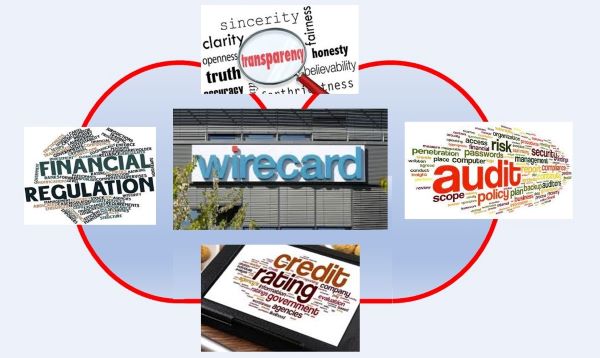BIIA reported the events leading up to the insolvency. Since the announcement by EY, that it could not provide an unqualified audit opinion, investors were led to believe that the Wirecard investment was of investment grade and a safe investment. Investors rely on reliable information, thus the first question one may ask: Did the information sector fail?
Insolvency filing: Wirecard filed for insolvency on June 26th, 2020, at Munich Local Court due to the threat of insolvency and over-indebtedness. The fintech company was one of the darlings of the investment community listed on the German DAX 30 index.
The DAX – also known as the Deutscher Aktien Index – is a stock index which represents 30 of the largest and most liquid German companies that trade on the Frankfurt Exchange.
Role of the information sector: Failure to predict default?
On Aug. 29 2019 Moody’s assigned German payment processor Wirecard AG a first-time Baa3 long-term issuer rating, with a stable outlook.
The rating took into account the company’s strong position in the European and Asian markets, its strong financial profile with very high margins and good liquidity profile. The rating also factors in the threat of competition from new entrants, the risk of regulatory and technological changes and pricing pressure as payment processing continues to become more of a commodity. Wirecard is smaller in scale compared to U.S.-based competitors, however, the company has a well-diversified business profile in terms of products, geographies and customers, the agency noted.
Moody’s downgraded Wirecard’s rating to ‘Junk’ on June 19th, 2020, after the EY announcement.
Rating agencies and credit information companies rely on audited financial statements. Investigations by the media, such as the investigation by the FT, or innuendo circulated by short sellers, have to be ignored unless they are supported by facts.
The auditor: EY certified Wirecard accounts for more than a decade
According to the FT, EY failed for more than three years to request crucial account information from Asian banks where Wirecard claimed to it had more than EURO 1,9bn in cash. The accounting firm relied on documents provided by third parties. This is a serious laps in not adhering to audit standards, which is tantamount to negligence. Obtaining independent confirmation of bank balances is a standard audit requirement one learns at audit school (FT quote).
The regulator: BaFin (Bundesanstalt fűr Finanzdienstleistungsaufsicht)
BaFin operates in the public interest. Its primary objective is to ensure the proper functioning, stability and integrity of the German financial system. Bank customers, insurance policyholders and investors ought to be able to trust the financial system.
Apart from the auditor, the German regulator BaFin has now moved into the spotlight concerning its supervision of Wirecard. BaFin appeared to have protected the company from attacks by short sellers when in February 2019 it imposed a two-month short-selling ban on Wirecard shares. In April of 2019 it filed a criminal complaint against two FT journalists who reported on whistleblower allegations of accounting fraud in Wirecard’s Singapore office.
The EU is now prompting its financial regulator Esma to investigate BaFin for a possible ‘breach of Union law’.
Summary: As the old adage goes: ‘It usually takes two to tango’. In the case of Wirecard it appears to be three: The culprit committing fraud, the auditor who failed to detect it and the regulator shooting the messengers who raised the alarm.
Facts are important, but when there are signals that facts are misrepresented and falsified, they cannot be ignored. That is the job of the regulator. Even if anomalies are detected by comparing financial ratios and industry trends, the credit rating and information businesses are hardly in a position to query a company’s results when audited by a certified public accountant.
Our predecessors in credit reporting used to have it easier: Abraham Lincoln*, while working as a correspondent for Dun & Bradstreet, expressed his opinion about the character of a business owner in a post scriptum: “Behind the counter is a rat hole and it is worth looking into.” In the case of Wirecard the FT shouted ‘rat hole’ and was sued. The regulator ignored the warning.
The above article is based on observation from press reports. The opinions expressed in this article are those of the author, Joachim C Bartels and do not necessarily reflect the position of BIIA members.
*As per an original copy of a credit report written by Abraham Lincoln archived at the Baker Library Harvard University. The quote may not exactly reflect the wording which Lincoln used.


























